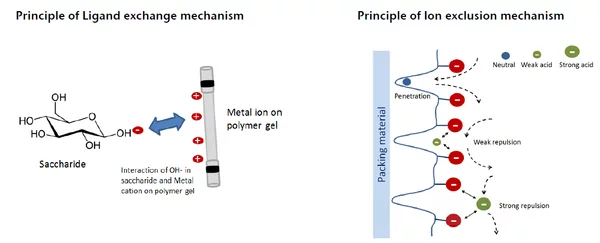-

Eurokat: valuable for food analysis
Eurokat high performance polymer phases were especially developed for the separation of organic acids, carbohydrates, alcohols and even complex mixtures of these compounds.

Eurokat high performance polymer phases were especially developed for the separation of organic acids, carbohydrates, alcohols and even complex mixtures of these compounds.
Eurokat is a sulfonated cross-linked styrenedivinylbenzene copolymer available in several ionic forms (H, Ca, Pb and Na). This particular cation exchanger is characterized by an outstanding density of functional groups, making it the ideal choice for your ion exclusion, size exclusion and ligand exchange chromatography.
Eurokat columns require no organic solvents and thus are environmentally friendly.
This particular cation exchanger is characterized by an outstanding density of functional groups, making it the ideal choice for your ion exclusion, size exclusion and ligand exchange chromatography.

|
Polymer |
cross-linked styrenedivinylbenzene copolymer |
|
Particle size |
10 μm, 20 μm |
| Cross linkage |
about 8 % (H-form) about 6 % (Ca, Pb, Na-form) |
|
Max. pressure |
up to 100 bar |
|
Max. temperature |
up to 90 °C |
Eurokat polymer columns are extremely stable over the whole pH range. This is one striking advantage compared with silica-based phases which have a limited lifetime at pH extremes, especially in the higher pH range. Most importantly, Eurokat phases show extraordinary column lifetime stability and are not affected by aqueous solvents.
We design and manufacture HPLC column hardware under strict quality control. A specially treated inner surface ensures consistent column packing and high column stability. Eurokat columns are available in lengths of 30, 120, and 300 mm. The 30 mm version is recommended as a guard column.
Outstanding separation results are achieved isocratically with fresh double-distilled water for Pb or Ca, or Na type Eurokat columns, while Eurokat H columns perform best when using inorganic acids. Such aqueous eluents produce no harmful waste as with organic solvents such as acetonitrile which necessitate expensive disposal.
The Eurokat stationary phase is designed to be applicable to a wide range of diverse chromatographic conditions. All Eurokat columns can be used at temperatures up to 90 °C under diverse pH conditions (e.g. using 0.001– 0.1 N H2SO4). For example, the best separation of sugars can be achieved using an acidic aqueous mobile phase at a temperature between 60 to 90 °C. To extend separation performance, it is possible to connect up to three columns of Eurokat in
series
Four different ionic species are available. Eurokat H is especially designed for the analysis of organic acids and even complex mixtures of acids, sugars and alcohols as well as sugar alcohols.
Eurokat Ca and Eurokat Pb are the phases of choice for analysis of smaller carbohydrates (DP < 4), Eurokat Ag is applicable for the separation of sugar oligomers. Eurokat can also be used for the determination of biochemically important molecules such as sugars, artificial sweeteners or acidic metabolic and degradation products.